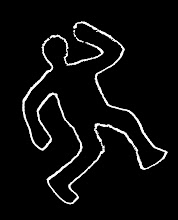
by Timothy Niederman
The dead hand held the pen so tightly that Detective Lieutenant Simon Ramsay couldn’t budge it. Maximum rigour. That meant Reginald Twichell had been a corpse for about twelve hours. The man’s features were drawn into a sneer. So far death was mimicking life exactly.
Ramsay had had one run-in with the living Ramsay, years ago. It hadn’t been pleasant. In that, of course, he was not alone. Ramsay had been naïve enough to think that a policeman’s memoir might have at least a niche audience in town. Twichell had taught him otherwise. As the senior critic of the Toronto Gazette, Ramsay had lorded pitilessly over the local literary establishment for years. His weekly “Twichell’s List” rankings of the efforts of local writers had jump-started a few careers, but had sunk many more. Or rendered them still-born, rather, for he preferred to review the first‑timers, the weakest, most vulnerable, those who were most hopeful, those who hungered for the slimmest word of praise to justify their years of anonymous toil now bound between covers and expectantly presented to the world. These were his prey.
His reviews were gems of literary assassination. To all those but the victim, his voluptuous prose was entertaining, a frequently vulgar, often high-camp romp through the fashions of literary history. Whereas he might impotently describe Tom Wolfe as “a Dickensian chronicler of the anti-squalour of the McMansion class,” (for Wolfe needed neither Twichell nor, in fact, his market), any attempt at an even light satire of Toronto society, for instance (which, as an inveterate ultra-snob, Twichell guarded zealously), would be dissected minutely and pilloried for its “cottage-country angst, devoid of all but the most hackneyed sentiment that, were it literate, would cause the ghost of Thackeray to rise from the deserved graveyard of nineteenth century excess and file suit for plagiarism and defilement of his genre.” Any budding writer, thus ravaged, would choose to decamp elsewhere. Many had.
“Well, he lived well, now didn’t he,” pronounced Sergeant Tilden, Ramsay’s second. Ramsay came out of his reverie.
“What did you say?”
Tilden was kneeling down over the torso going through Ramsay’s pockets.
“He ate well, or at least his last meal was pretty fancy. Oysters. Fairly reeks of them. Take a sniff.” Ramsay shook his head slowly, declining the invitation, and looked down at the body for a long moment. Then he scowled and shifted his gaze toward the pen, still clutched like the weapon it was in Twichell’s hand.
Abruptly Ramsay turned, walked over to Twichell’s desk and picked up last weekend’s book review section, which was lying open. He read for a short while and then summoned Tilden.
“I want you to pick up this man, James Sonderheim, for questioning.” He was pointing at the name of the author of a book being prominently reviewed by none other than the dead Twichell.
“Why?”
“Look at this.” Ramsay indicated a paragraph toward the end of the review.
Tilden began reading aloud: “ ‘Mr. Sondenheim appears to be totally oblivious to the irony of a man as homely as the face on his dust jacket would seem to demonstrate agonizing clumsily over the minutiae of the daily toilet of a movie start of the stature of his protagonist. Mr. Sondenheim is betraying a star-struck obliviousness not just to his own mediocrity but to the true fastidiousness any talent must bring to bear on his work, a fastidiousness, it must be noted, that this particular author, as evidenced by the turgid relentlessness of his prose, displays not the merest smidgen of’. ”
Tilden looked quizzically toward his superior.
“Twichell didn’t eat oysters,” Ramsay explained. That smell is DMSO---dimethylsulfoxide---a chemical that enters the skin extremely rapidly, taking with it anything that it might be mixed with.”
Tilden’s face remained clouded.
“The pen,” Ramsay offered.
“You mean. . .?
“Yes. Poisoned. I think we’ll find that Mr. Sondenheim’s sense of irony is very well developed indeed.”
Tilden nodded, and without a word turned and left the room.










































